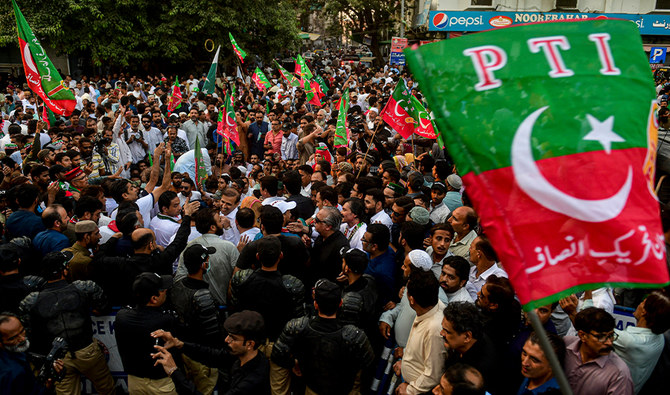ISLAMABAD: Former prime minister Imran Khan’s Pakistan Tehreek-e-Insaf (PTI) party on Saturday filed a petition in a high court against his disqualification from holding a public office by the country’s election oversight body a day earlier, a senior PTI leader said.
The Election Commission of Pakistan (ECP) disqualified Khan under article 63(1)(p) of the constitution for “deliberately” concealing material facts about proceeds from the sale of gifts he received as the prime minister in the statement of his assets and liabilities for year 2018-19.
The verdict in a case that has come to be known as the Toshakhana reference is the latest twist in political wrangling that began even before Khan’s ouster in a no-trust vote in April and is one of several legal battles being fought by the former premier and his party.
As Khan’s opponents, including Prime Minister Shehbaz Sharif, hailed the ECP verdict on Friday, his party announced challenging the decision in the high court.
“Petition filed in the high court against the election commission’s verdict,” PTI Secretary-General Asad Umar said on Twitter.
“Hearing of the case on Monday.”
The former premier was found guilty of “corrupt practices” under Article 63(1)(p) of the constitution, the election tribunal ruled on Friday.
The article says that a person can be disqualified from being a member of parliament if “he is for the time being disqualified from being elected or chosen as a member of the Majlis-e-Shoora (Parliament) or of a Provincial Assembly under any law for the time being in force.”
While the election commission has yet to release a detailed judgment in the case on account of a tribunal member being away on a medical leave, legal and constitutional experts say Khan could contest the next election but the sword of disqualification would keep hanging over him.
Advocate Taimur Malik said this was “a case of first impression,” therefore the courts would have to interpret it.
“But one thing is for sure that Imran Khan can contest the next general election anyhow,” he told Arab News.
Malik pointed out some legal loopholes in the judgment, saying a high court or the Supreme Court could overturn it.
“Technically and legally, the assets and liabilities statements could be challenged within 120 days, but here the election commission has decided on the returns filed in 2018-19,” he noted, saying the limitation period for the returns filed in 2021 expired by the end of April 2022.
“This violation of the limitation period cannot be justified in the courts.”
The expert also said that criminal proceedings against Khan, as per the directions of the election commission, could turn into a long legal battle.
“With cases being in courts, the sword of conviction and disqualification will keep hanging on Imran Khan unless the courts either set aside them or exonerate him in all,” he said.
Experts have also been puzzled by the election commission’s failure to release the detailed judgment in the case.
Advocate Faisal Fareed, one of the lawyers representing Khan’s party, said the delay was creating doubts as to why it was announced as “unanimous,” when one of the tribunal’s members had not signed it.
“We have applied for a signed copy of the judgment,” he told Arab News.
The election commission said the judgment was already reserved, but a member had yet to sign it.
“One of the members is suffering from dengue fever and his signature is awaited,” the ECP said in a statement.
Experts also question the urgent manner in which the judgment was announced.
Ahmed Bilal Mehboob, president of Islamabad-based think tank PILDAT, said the judgment was vague in many ways and failed to specify the period or any specific constituency for the disqualification.
“The courts will have to clear a number of things in the judgment,” he told Arab News.


















